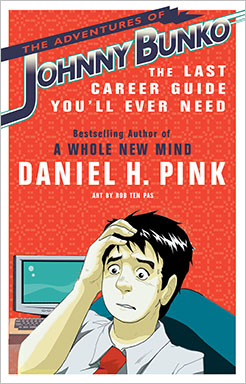 Read a comic book – it’s good for your career! Well, not just any comic book. I recommend “The Adventures of Johnny Bunko: The Last Career Guide You’ll Ever Need.” It is, hands down, the most unique and entertaining career management book I’ve ever read. And its career advice is solid – six essential lessons for thriving in your career.
Read a comic book – it’s good for your career! Well, not just any comic book. I recommend “The Adventures of Johnny Bunko: The Last Career Guide You’ll Ever Need.” It is, hands down, the most unique and entertaining career management book I’ve ever read. And its career advice is solid – six essential lessons for thriving in your career.
This clever book is touted as “America’s first business book in the Japanese comic format known as manga.” It’s the highly entertaining story of Johnny Bunko, a would-be art history major who ended up in corporate accounting, feeling stuck and miserable. Until he meets Diana, the strangest career advisor ever imagined. Diana shares six lessons to get his career back on the right path.
The story is written by Dan Pink, one of my all-time favorite authors. I am a raving fan of his bestsellers A Whole New Mind: Why Right-Brainers Will Rule the Future and Drive: The Surprising Truth About What Motivates Us. Those books are not manga; however, there’s a fantastic RSAnimate (hand-drawn cartoon animation) version of Dan’s wildly popular TED Talk on The Surprising Truth About What Motivates Us, watch it here.
While Johnny Bunko’s adventures are set in a corporate work setting, I think the six lessons he learns are universal. They definitely apply to careers in aid and development.
The book is well worth a read – and will only take you about an hour to get through. If you can’t get your hands on the book, here’s my summary of the six lessons (and there are no spoilers here, so you can still read on and enjoy the book later):
- There is no plan. You know I agree with this – I wrote recently about why I don’t believe in five-year career plans. I like the book’s distinction between instrumental reasons for making a career decision (you take a job, regardless of whether you’d enjoy it or find it meaningful, because you think – or hope! – it will lead to something else) versus fundamental reasons (you take a job because you it’s “inherently valuable, regardless of what it may or not lead to.”) Johnny learns that instrumental reasons don’t work: it’s too hard to predict what will happen, so you end up being stuck.
- Think strengths, not weaknesses. Focusing on your strengths is the key to success (and happiness), as I’ve written about here. What are strengths? What you consistently do well, what gives you energy (before, during, and after the activity), and what creates a sense of “flow” for you.
- It’s not about you. I love how Diana, the career advisor, puts it: “You’re here to serve, not self-actualize.” (And I would add, serving can help lead you more quickly to self-actualization.) For development professionals, the point is kind of obvious: you’re in this job because you believe it will make an impact in a corner of the world that needs it. But the reminder “It’s not about you” applies not only to the ultimate beneficiaries of your work, but also the people with whom you interact and collaborate to get that work done: your colleagues, your boss, your direct reports, your project partners. As Diana puts it, “The most valuable people in any job bring out the best in others. They make their boss look good. They help their teammates succeed.”
- Persistence trumps talent. Persistence is like compound interest: a small amount improves performance, which encourages even more persistence, which leads to better performance, and on and on. When we’re intrinsically motivated to do things, we’re more likely to persist at them, and the more likely we are to succeed. So it’s better not to focus on extrinsic motivators like pay, bonuses, and awards.
- Make excellent mistakes. We’re all afraid of making mistakes (although in the aid community there has been more discussion recently about “admitting failure”). This fear can cost us – it keeps us playing small, never trying anything. Johnny learns that “the most successful people make spectacular mistakes,” but then learn from those experiences. The key is to learn more from the mistake than the cost of the mistake.
- Leave an imprint. This one needs little explanation for development workers. Make your work about something that matters. Know your why.
To these 6 universal, practical tips I would simply add: Learn not to take yourself, your job, or your career too seriously. I say “learn” because there are specific techniques you can master to keep yourself from getting hooked into the inevitable emotions and frustrations of the world of work. (I’ll write more about that in the future.) Not taking your job too seriously (even when you’re “leaving an imprint” and not making it “about you”) will also bring you closer to that elusive work/life balance and help you cultivate your relationships, interests, and identity outside of work. Which can ultimately help you succeed professionally.
Which of these lessons resonate with you? What would you add? I’d love to hear your thoughts – leave a comment, shoot me an email (shana (at) developmentcrossroads (dot) com), or tweet me at https://twitter.com/#!/devxroads.

